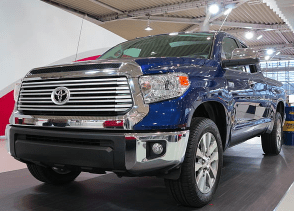The VSC (Vehicle Stability Control) system is a traction/stability control system designed by Toyota and is used on all of their modern cars and trucks, including the Tundra. Like any other electronics system in a vehicle, it can malfunction. We’ll go over how the VSC system works and what can cause it to malfunction below. It is designed to prevent skidding when driving in poor conditions, such as mud, snow, rain, oily intersection, or anywhere else that traction could be compromised.
How Does the Tundra’s VSC System Work?
The VSC system works by piggybacking off of the Tundra’s ABS system, which means that if one has a problem, the other one usually does too.
Brake Control
The VSC system works by using the wheel speed sensors to detect when one of the wheels is not getting have traction. It then applies the brakes to that specific wheel to keep it from spinning. At the same time, it also reduces engine power. This keeps the vehicle from spinning out.
Throttle Control
The VSC system has the ability to slow the engine’s rev’s down. Otherwise, when it applies the brakes to a slipping drive wheel, the other one would break loose. This could cause the Tundra to crash. It would also be hard on the driveline components to handle braking at one wheel while accelerating at another.
What Does it Mean When the VSC Light Comes On?
It means that your Tundra no longer has traction control or stability control. Your car will still drive normally, it just won’t have this system ready to protect you if things go awry. Drive carefully.
Check VSC System Diagnosis: Toyota Tundra
There are a number of issues that can cause the “Check VSC” Light/Error Message to come on. The most important thing to know is there are going to be DTC codes stored in the Tundra’s computer that will help you determine what is going on.
Here are the most likely causes that the VSC Light would stay on:
1. Loose/Bad Fuel Cap
Although it seems like it would be counterintuitive, a bad/loose gas cap can make the VSC light stay on. This should be the first thing that you check. Make sure that the cap is seated properly and that the rubber gasket underneath of it is not damaged or broken.
2. Bad Wheel Speed Sensor
The wheel speed sensor measures the speed of each wheel and checks it against the vehicle speed sensor, as well as each other. If one of the sensors is sending a signal that is unreliable, the VSS system will deactivate.
In extreme snow or mud, the wheel speed sensors can get covered enough that they are no longer able to function properly. When this happens they either need to be cleaned off, or given enough time for the snow to melt.
3. ABS System Issues
As stated earlier, the VSC System piggybacks off of the ABS. A problem with one, will often lead to a problem with the other. Not every code scanner is going to be able to pull ABS codes. Make sure that you get one that can. Here’s more on diagnosing ABS problems in your Tundra.
Can You Drive Your Tundra With the VSC Light On?
Yes, you can drive with the VSC light on. Your Toyota Tundra will run and drive completely normal. You do need to be aware that the vehicle stability control system is an important safety feature. Ignoring the problem for a prolonged period of time is not advised. You can go for years without needing the VSC system, but when you do it can save you from wrecking.
When to use VSC Off Button
VSC is a great system, but there are certain conditions that you may be better off with it deactivated. That’s why Toyota gives you the option to turn it off.
Here are some conditions where your Tundra’s VSC System may need to be turned off.
Mud or Snow
If there is a little snow or mud, the VSC system can really help keep you safe. We always recommend keeping the system on if your Tundra is moving in these conditions. It’s when you get hung up that the system may need to be turned off.
If you’ve ever been hung up in the mud or snow, you know that rocking the vehicle is the way to get out. Rocking involves quickly switching from first/drive to reverse in order to “rock” the vehicle out of the mud. The process involves building a momentum using the force of the wheels spinning fast (something the VSC system will not allow).
VSC Malfunction
If the VSC system is malfunctioning, turning it off is the only option there is. If you notice that the engine seems to be down on power compared to normal, and that the brakes almost feel like they are dragging, that is a strong indication that the VSC system is experiencing an error.
Turning it off will restore the power and full control of the brake system.
Conclusion
Your VSC light staying on means that the Toyota Tundra’s VSC system has been deactivated. It is not as safe to drive without it on, but it should still drive fine. Good luck determining what is causing the problem. Remember, a good code scanner can save a ton of time.

